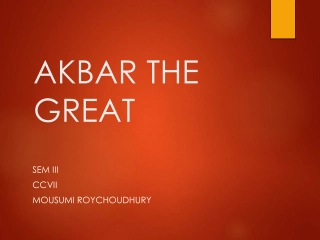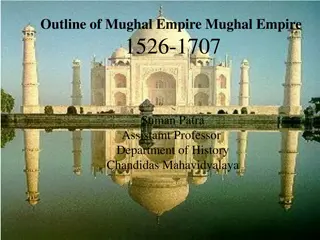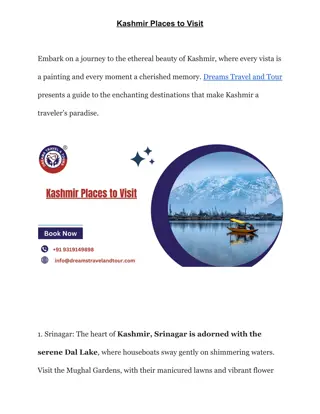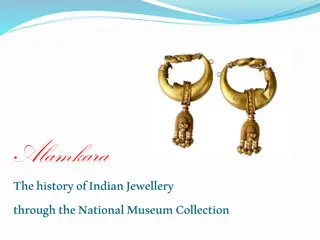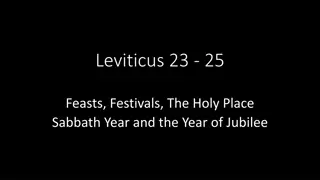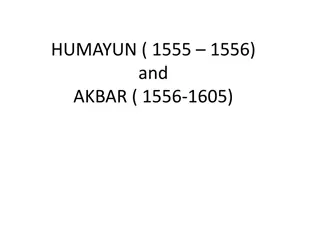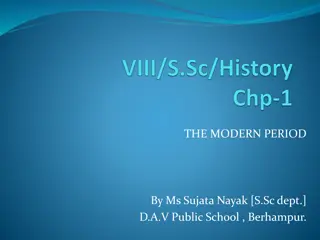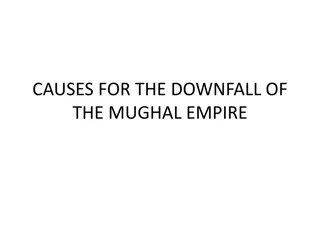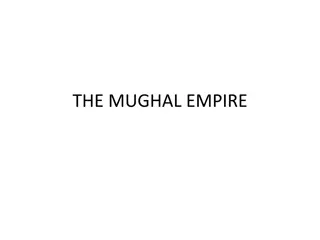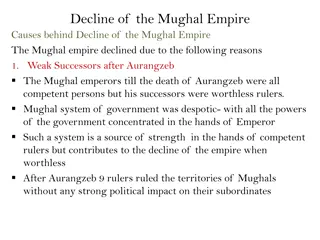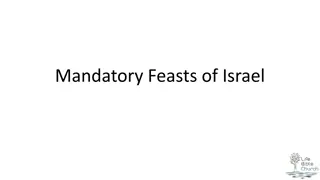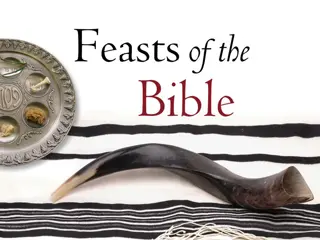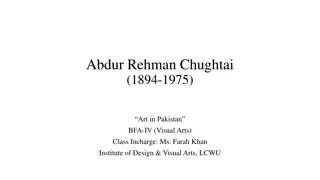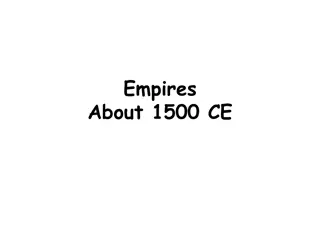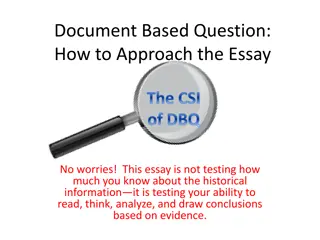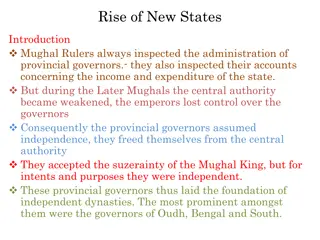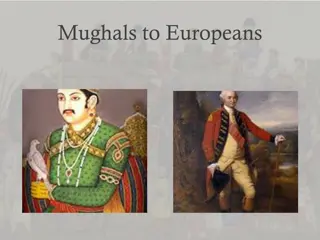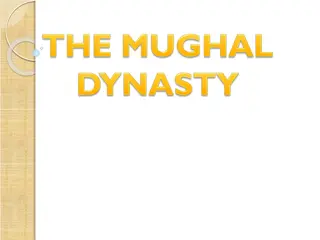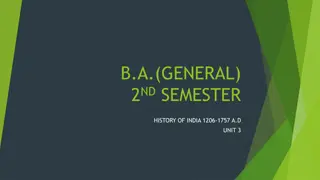AKBAR THE GREAT
After the death of Humayun, his young son Akbar assumed the Mughal throne with the guidance of Bairam Khan. Facing political unrest and enemies, Akbar's rule saw significant accomplishments, such as defeating Hemu at the Second Battle of Panipat and establishing a strong administrative system. His e
2 views • 31 slides
Various Types of Celebrations and Essential Needs for a Successful Event
Explore different types of celebrations such as birthday parties, engagement parties, Ramadan feasts, and more. Discover the essential items required for celebrations like balloons, decorations, food, and music. Access related games and activities through provided links for an interactive learning e
3 views • 43 slides
Outline of Mughal Empire Mughal Empire 1526-1707.
The Mughal Empire in India from 1526 to 1707 was a significant period marked by notable rulers such as Babur, Humayun, Akbar, Jehangir, Shah Jehan, and Aurangzeb. These emperors each contributed differently to the empire's development, with highlights including military conquests, administrative ref
7 views • 14 slides
Kashmir Holiday Packages
Escape to the stunning beauty of Kashmir with Dream Travel and Tours' exclusive holiday packages. Cruise Dal Lake on a Shikara, trek through lush valleys, and explore Mughal gardens\u2014Immerse in Kashmir's culture and spirituality with top-notch accommodations and expert guides. Let us craft your
2 views • 2 slides
Insights into the Perfumery Industry in Kannauj
A presentation by the Additional Commissioner highlighting the historical backdrop and current state of the perfumery industry in Kannauj, including statistics on registered firms, tax liabilities, and the process of itra extraction. The industry plays a significant role in the region's economy, wit
0 views • 18 slides
Kashmir Places to Visit
Discover the allure of Kashmir with Dreams Travel and Tour. Explore Srinagar's Dal Lake and Mughal Gardens, ski the slopes of Gulmarg, wander through Pahalgam's pine forests, marvel at Sonmarg's glaciers, and venture into the rugged beauty of Leh-Ladakh. Let us guide you to the jewels of Kashmir.
2 views • 3 slides
Exploring the Rich History of Indian Jewellery Through the National Museum Collection
Uncover the fascinating world of Indian jewellery through the historical artifacts in the National Museum Collection. From ancient adornments dating back almost 3000 years to the exquisite Mughal jewels, discover the evolution of styles, materials, and techniques. Explore the significance of jewelle
0 views • 16 slides
Evolution of Akbar's Religious Policy: A Historical Overview
In the 16th century, Akbar the Great implemented a revolutionary religious policy in the Mughal Empire. Initially a devout Sunni Muslim, Akbar evolved his stance to promote harmony and equality among all religions, fostering tolerance and understanding. This shift marked a significant departure from
1 views • 25 slides
Understanding the Feasts and Festivals in Leviticus
Explore the significance of the feasts, festivals, and rituals outlined in Leviticus, such as Passover, the Feast of Unleavened Bread, and the Day of Atonement. Discover how these observances served to set the Israelites apart and foster spiritual growth and connection with God.
1 views • 14 slides
Rajput and Religious Policy of Mughal Emperors: Akbar vs. Aurangzeb
Akbar, the first Mughal emperor, pursued a diplomatic policy towards the Rajputs, aiming to bring them under his suzerainty while maintaining friendly relations. His successor, Aurangzeb, adopted a more aggressive approach, seeking to annex Rajput kingdoms due to religious differences. This shift in
0 views • 6 slides
The Mughal Emperors Humayun and Akbar: A Legacy of Conquest and Diplomacy
Humayun, though not a skilled general, was kind and learned, while Akbar, one of the greatest monarchs of India, expanded the Mughal Empire through military conquests and strategic alliances with the Rajputs. Akbar's policy of religious tolerance and Rajput integration left a lasting impact on the M
0 views • 21 slides
Modern Period of Indian History: From Mughal Decline to Independence
The modern period of Indian history began in the 18th century after Aurangzeb's death, marked by British colonization and the struggle for independence led by key figures like Gandhi. Sources like British documents, books, and speeches provide insights into this transformative era.
0 views • 11 slides
Development of Indian Penal Code (IPC) 1860 and Its Impact in British India
The Indian Penal Code (IPC) of 1860 was introduced in British India after a series of historical events led to the need for a comprehensive criminal justice system. The disintegration of the Mughal Empire paved the way for British takeover, resulting in variations in criminal laws across different B
1 views • 24 slides
Causes for the Downfall of the Mughal Empire
The decline of the Mughal Empire post-Aurangzeb's reign was due to factors such as religious persecution, the Deccan policies, weak successors, financial difficulties, neglect of sea power, European settlement, and invasions. These political, social, and economic issues contributed to the downfall o
0 views • 9 slides
The Mughal Empire: History and Legacy
The Mughal Empire was founded by Babur, a skilled statesman and conqueror. His military conquests paved the way for the empire's expansion in India. Babur's son Humayun faced challenges during his reign, leading to a period of instability. Despite difficulties, the Mughal Empire left a lasting impac
0 views • 13 slides
Causes Behind the Decline of the Mughal Empire
The decline of the Mughal Empire was influenced by weak successors after Aurangzeb, degeneration of Mughal nobility, inefficiency of the army, economic bankruptcy, foreign invasions, wars of succession, and court factions. The empire faced challenges such as incompetent rulers, weakened military, fi
2 views • 5 slides
Rare Bone Disease Research Highlights from ASBMR 2021
Explore the latest findings and insights in rare bone diseases presented by experts like Dr. Kassim Javaid and Dr. Zulf Mughal at ASBMR 2021. This independent educational programme focuses on translating research into clinical practice, raising awareness, and improving early diagnosis globally. Watc
0 views • 23 slides
Jordanian Traditions: Mansaf and Coffee Culture
Explore the rich Jordanian traditions of Mansaf, a delicious dish made with lamb and yogurt, and the cultural significance of Jordanian coffee, known as Al-Qahwa, in social gatherings and events like weddings and feasts.
0 views • 6 slides
Comparison of Jewish Feasts and Christian Equivalents
Explore the three main Jewish feasts - Pesach (Passover), Shavuot (Pentecost), and Sukkot - and their Christian counterparts. Discover the significant events, traditions, and symbolic meanings associated with each celebration, emphasizing the connections between the Old Testament feasts and their Ch
0 views • 11 slides
The Significant Feasts of Israel
The Feasts of Israel are mandatory observances that hold great spiritual significance for the Jewish people. These feasts include the Sabbath, Feast of Trumpets, Passover and Unleavened Bread, Pentecost, Day of Atonement, Booths, and more. Each feast is celebrated at a specific time of the year and
0 views • 6 slides
God's Calendar of Redemption: Insights from the Feasts in Leviticus 23
Discover the significance of the seven holidays appointed by God in Leviticus 23 for the Israelites, reflecting themes of protection, provision, promise, and redemption. Explore how these feasts foreshadow Jesus' sacrifice, resurrection, and the work of the Holy Spirit, culminating in the fulfillmen
0 views • 6 slides
The Significance of Pentecost in Jewish and Christian Traditions
The three annual feasts of the Jews - Passover, Pentecost, and Feast of Tabernacles - held deep religious significance, with Pentecost being the 50th day after Passover. This day was pivotal in history, marking important events for both Jews and Christians. Pentecost was a time of harvest, giving of
0 views • 7 slides
Evolution of Entrepreneurship in India Through Historical Eras
Entrepreneurship in India has evolved over centuries, starting from the Indus Valley Civilization to the Gupta Era and the Mughal Age. Traders, innovators, and risk-takers played crucial roles in shaping economic activities through trade, exploration, and commerce. The historical timeline reflects t
0 views • 18 slides
Understanding the Cultural Dimensions of Food and Religious Influences in Culinary Arts
Explore the impact of religious beliefs on food traditions and dietary restrictions across different cultures in the culinary world. Learn about the influence of major world religions on eating habits, food choices, and culinary practices. Discover how various religious groups, such as Christians, o
0 views • 26 slides
Mapping Time and Culture: Mughal Feasts in Early Modern Era
Visual mapping of Mughal feasts in the early modern era provides insight into the historical and cultural connections between Eastern and Western memoirs. By analyzing the role of feasts in a connected history, this project applies a quantitative and visual approach through digital humanities to und
0 views • 11 slides
Life and Legacy of Abdur Rehman Chughtai: A Pioneer in Pakistani Art
Abdur Rehman Chughtai (1894-1975) was a celebrated painter and intellectual from Pakistan, known for his unique fusion of Mughal art, miniature painting, Art Nouveau, and Islamic art traditions. His contributions to modern South Asian art were groundbreaking, earning him titles and awards for his ex
0 views • 25 slides
The Empires and Explorations of 1500 CE
Explore the empires and events of 1500 CE, from the Ottoman Empire to the Mughal Empire, and the reasons behind European exploration. Immerse yourself in the history of trade, culture, and conquests that shaped this era.
0 views • 26 slides
Ancient Greek Olympics: Insights into Sports and Culture
The ancient Greek Olympics provide a window into the sporting culture of the Greeks. Dating back to the 9th century BC, the games evolved over time to include various events like footraces, wrestling, boxing, and chariot racing. Competitors were free-born Greek men, with prizes including olive leaf
0 views • 9 slides
Unveiling the Strengths and Weaknesses of Muslim Empires
Explore the rise and fall of the Ottoman, Safavid, and Mughal empires through a document-based question (DBQ) essay. Understand the factors attributing to their success and decline, analyze historical backgrounds, and discuss potential empire-building strategies. Dive into the investigation with cri
0 views • 10 slides
The Rise of New States and Hindu Principalities in Decline of the Mughal Empire
During the later Mughal period, provincial governors gained independence, laying the foundation for new dynasties in regions like Oudh, Bengal, and South. The rise of Hindu states, including Rajputs and Sikhs, contributed to the disintegration of the Mughal Empire. Governors like Saadat Khan Burhan-
0 views • 8 slides
European Influence in South Asia: From Mughals to British Crown
Explore the historical journey of European intervention in South Asia, beginning with the Mughal era and culminating in British colonial rule. Learn about the motivations, impact, and changing relations over the centuries, from Portuguese exploration to the rise of the British East India Company.
0 views • 13 slides
Overview of the Mughal Empire and Its Great Mughals
The Mughal Empire was a significant imperial power in the Indian subcontinent from 1526 to 1757, ruled by Muslim descendants of Genghis Khan. The empire extended over a vast region and produced six great Mughal rulers: Babur, Humayun, Akbar, Jahangir, Shah Jahan, and Aurangzeb. Babur was the founder
0 views • 14 slides
The Queen's Decision in the Book of Esther
A narrative from the book of Esther about Queen Vashti's decision during King Ahasuerus' reign, depicting lavish feasts, colorful decorations, and the royal court's lifestyle. The story sets the stage for subsequent events in the Persian Empire, showcasing opulence and cultural practices of that era
0 views • 11 slides
Akbar's Consolidation of Mughal Rule and Administrative Reforms in India (1206-1757)
Akbar, following Humayun's death, defeated Hemu and established Mughal rule. His reign marked significant administrative and revenue reforms, including Hindu participation and religious tolerance. Akbar's policies led to the expansion and consolidation of the Mughal Empire across northern and centra
0 views • 5 slides
